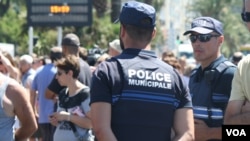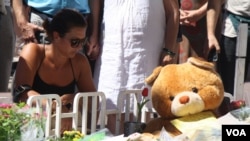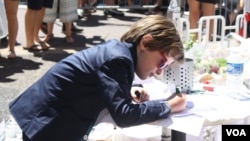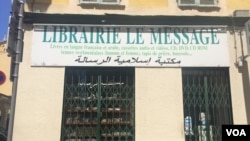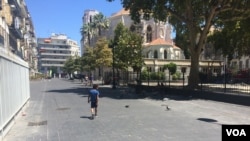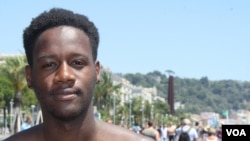For the past two days, the Promenade des Anglais has been remarkably quiet, despite the crowds of mourners.
Every few steps of a two-kilometer strip of the promenade has some kind of memorial - flowers, notes, or candles - marking the place where one of the 84 victims died.
But for a brief time on Sunday, the hush was shattered.
Next to the largest memorial, a growing pile of offerings surrounded by growing numbers of mourners, a protest of just a few people had dozens of people arguing loudly.
The protesters stood silently, holding a cardboard sign calling on the government to “arm the citizens.” It was well understood the protesters represented the growing far right movement in France, which fuels anti-Muslim sentiment that has followed recent terrorist attacks.
For some, the small protest was a sign of growing divisions in Nice and in the world. In the Riviera city, rifts between the Muslim community and others could be devastating, said Sylvin Henrick, a young man in dreadlocks and a “Summer in L.A.” tank top.
“The government is trying to pit the people against Muslims,” he says. “It will amplify the divisions.”
By some estimates, as much as 40 percent of the population of Nice is Muslim, while roughly eight percent of the entire country is Muslim. The largest single immigrant group in Nice is Tunisian.
After the protest dispersed, Marie Sophie Hett, a retired nurse, echoed sentiments of far right leaders who have been highly critical of the security on the night of the attack. While crowds celebrated Bastille Day with fireworks, 31-year-old Mohamed Bouhlel was able to plow a truck through a pedestrian area, despite barriers put up to prevent vehicular traffic.
And like the far right leadership, Hett generally blames the large population of Muslims for the violence.
“It’s true. They must arm the people,” she says. “We are human beings and we have had enough.”
Arm against whom?
On the other side of the city, in a neighborhood largely populated by immigrants, Muslim residents say they feel ostracized by local French people after a terrorist attack. And every time it happens, it's worse than the time before.
“No one knows what will happen to Arabs here,” says Bel Haj, from Tunisia, who installs and repairs cooling systems. “They look at us like we were the man driving the truck.”
In the past year and half, terrorist attacks in France have killed nearly 240 people and wounded hundreds.
Ibrahim, a 29-year-old Tunisian painter who has lived in France for 15 years, pulls out a cracked mobile phone and plays a video of a Tunisian man weeping outside a hospital. The man in the video lost his wife and his small son in the attack. “Our hearts are with the victims,” says Ibrahim, sitting on a parked motorcycle. “Islam is against all terrorists.”
Bouhlel, the attacker, was also not much of a Muslim, he says. Before police shot him, ending his deadly rampage, he was known to be a petty thief, a brawler and to possess a medley of other qualities that don’t fit with many people's notions of what an Islamist terrorist should be like.
Islamic State militants claim Bouhlel was acting on their behalf, but stopped short of saying he was acting on their orders. Several people connected to Bouhlel have been taken into custody during the weekend, but authorities have said he may have been acting alone.
“That man was an idiot,” says Qusai, a 25-year-old construction worker from Tunisia who has lived in France for eight years. “He was not an Islamic state fighter. He was nothing.”
The growing right
Meanwhile, life is getting harder for in this neighborhood, as politicians rile-up anti-immigration sentiment before presidential elections in Europe and the United States.
In France, as 2017 elections loom, Marine Le Pen is the head of the anti-immigrant, anti-Muslim National Front, which has gained popularity as Islamophobia rises in the wake of the European refugee crisis.
“The war against the scourge of Islamic fundamentalism has not started, it now must be declared urgently,” she says in a statement reacting to the Nice attacks.
At the protest near the memorial, 20-year-old American-Congolese university student Bahati Nkera says it is no great surprise that fear of terrorism allows political groups to push forth their agenda.
Motioning towards the mourners, where toys are strewn among the mementos, he says, “But it’s sad to see this happen right in front of a memorial for children.”




